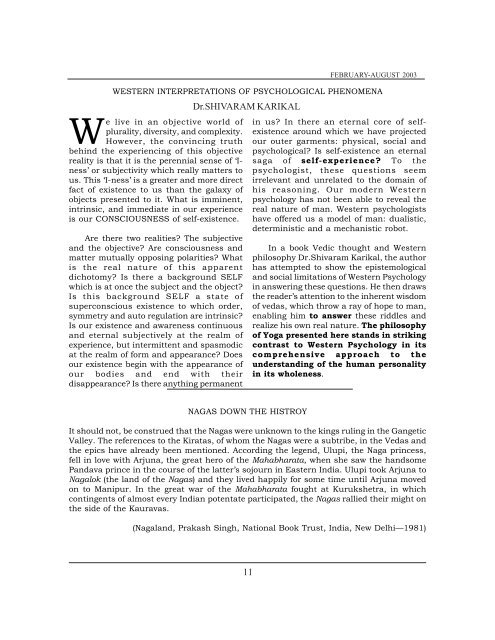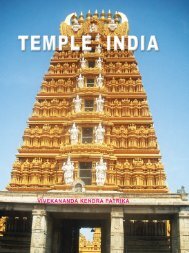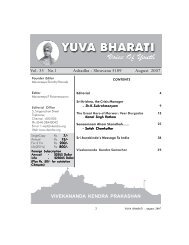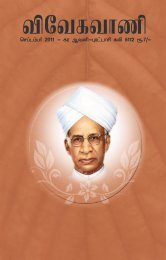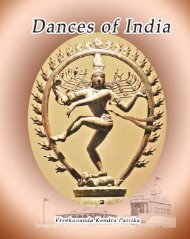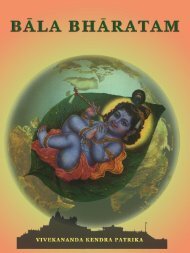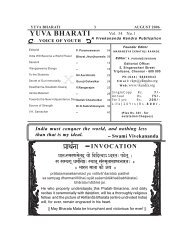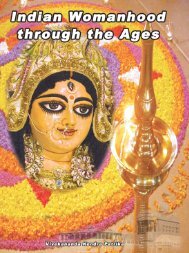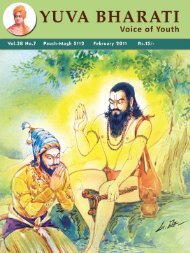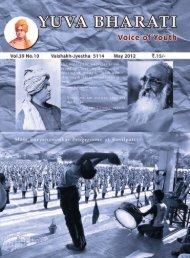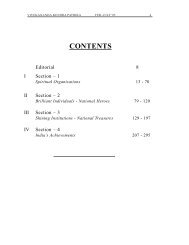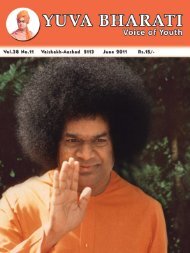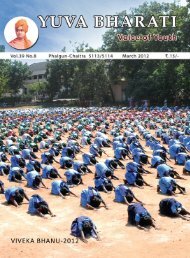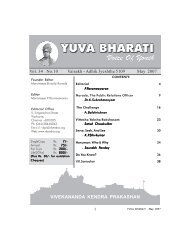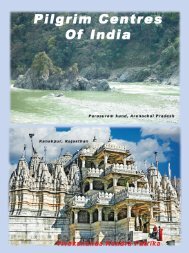Epics in Imprints-1.pdf - Vivekananda Kendra Prakashan
Epics in Imprints-1.pdf - Vivekananda Kendra Prakashan
Epics in Imprints-1.pdf - Vivekananda Kendra Prakashan
Create successful ePaper yourself
Turn your PDF publications into a flip-book with our unique Google optimized e-Paper software.
We live <strong>in</strong> an objective world of<br />
plurality, diversity, and complexity.<br />
However, the conv<strong>in</strong>c<strong>in</strong>g truth<br />
beh<strong>in</strong>d the experienc<strong>in</strong>g of this objective<br />
reality is that it is the perennial sense of ‘Iness’<br />
or subjectivity which really matters to<br />
us. This ‘I-ness’ is a greater and more direct<br />
fact of existence to us than the galaxy of<br />
objects presented to it. What is imm<strong>in</strong>ent,<br />
<strong>in</strong>tr<strong>in</strong>sic, and immediate <strong>in</strong> our experience<br />
is our CONSCIOUSNESS of self-existence.<br />
Are there two realities? The subjective<br />
and the objective? Are consciousness and<br />
matter mutually oppos<strong>in</strong>g polarities? What<br />
is the real nature of this apparent<br />
dichotomy? Is there a background SELF<br />
which is at once the subject and the object?<br />
Is this background SELF a state of<br />
superconscious existence to which order,<br />
symmetry and auto regulation are <strong>in</strong>tr<strong>in</strong>sic?<br />
Is our existence and awareness cont<strong>in</strong>uous<br />
and eternal subjectively at the realm of<br />
experience, but <strong>in</strong>termittent and spasmodic<br />
at the realm of form and appearance? Does<br />
our existence beg<strong>in</strong> with the appearance of<br />
our bodies and end with their<br />
disappearance? Is there anyth<strong>in</strong>g permanent<br />
11<br />
FEBRUARY-AUGUST 2003<br />
WESTERN INTERPRETATIONS OF PSYCHOLOGICAL PHENOMENA<br />
Dr.SHIVARAM KARIKAL<br />
NAGAS DOWN THE HISTROY<br />
<strong>in</strong> us? In there an eternal core of selfexistence<br />
around which we have projected<br />
our outer garments: physical, social and<br />
psychological? Is self-existence an eternal<br />
saga of self-experience? To the<br />
psychologist, these questions seem<br />
irrelevant and unrelated to the doma<strong>in</strong> of<br />
his reason<strong>in</strong>g. Our modern Western<br />
psychology has not been able to reveal the<br />
real nature of man. Western psychologists<br />
have offered us a model of man: dualistic,<br />
determ<strong>in</strong>istic and a mechanistic robot.<br />
In a book Vedic thought and Western<br />
philosophy Dr.Shivaram Karikal, the author<br />
has attempted to show the epistemological<br />
and social limitations of Western Psychology<br />
<strong>in</strong> answer<strong>in</strong>g these questions. He then draws<br />
the reader’s attention to the <strong>in</strong>herent wisdom<br />
of vedas, which throw a ray of hope to man,<br />
enabl<strong>in</strong>g him to answer these riddles and<br />
realize his own real nature. The philosophy<br />
of Yoga presented here stands <strong>in</strong> strik<strong>in</strong>g<br />
contrast to Western Psychology <strong>in</strong> its<br />
comprehensive approach to the<br />
understand<strong>in</strong>g of the human personality<br />
<strong>in</strong> its wholeness.<br />
It should not, be construed that the Nagas were unknown to the k<strong>in</strong>gs rul<strong>in</strong>g <strong>in</strong> the Gangetic<br />
Valley. The references to the Kiratas, of whom the Nagas were a subtribe, <strong>in</strong> the Vedas and<br />
the epics have already been mentioned. Accord<strong>in</strong>g the legend, Ulupi, the Naga pr<strong>in</strong>cess,<br />
fell <strong>in</strong> love with Arjuna, the great hero of the Mahabharata, when she saw the handsome<br />
Pandava pr<strong>in</strong>ce <strong>in</strong> the course of the latter’s sojourn <strong>in</strong> Eastern India. Ulupi took Arjuna to<br />
Nagalok (the land of the Nagas) and they lived happily for some time until Arjuna moved<br />
on to Manipur. In the great war of the Mahabharata fought at Kurukshetra, <strong>in</strong> which<br />
cont<strong>in</strong>gents of almost every Indian potentate participated, the Nagas rallied their might on<br />
the side of the Kauravas.<br />
(Nagaland, Prakash S<strong>in</strong>gh, National Book Trust, India, New Delhi—1981)


